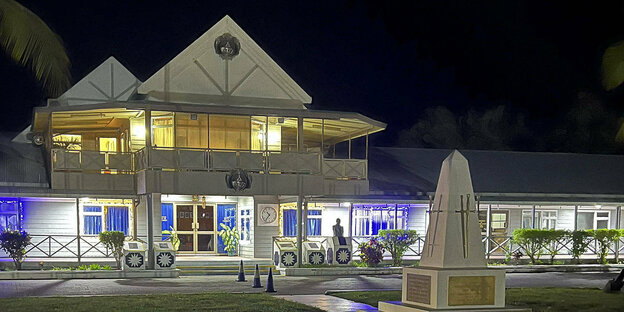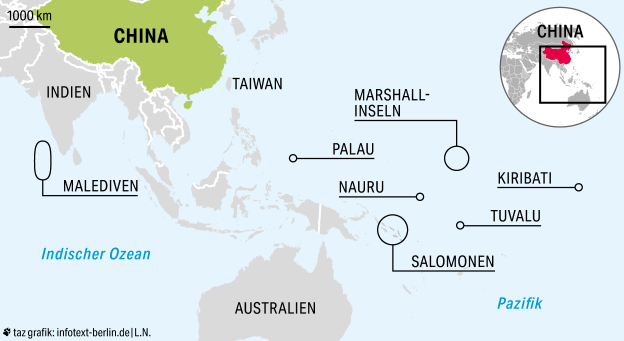The Pacific state of Nauru lives up to its reputation for supposedly selling diplomatic relations. Beijing and Taipei already know this.

The Parliament of Nauru on January 15, 2024 Photo: Liang Bijiao/imago
SEDAN taz | Just two days after the election of Beijing critic William Lai Ching-te as Taiwan's new president, the Pacific state of Nauru announced it would now diplomatically recognize the People's Republic of China. Under the one-China policy imposed by Beijing, this automatically means severing relations with Taiwan. China also welcomed Nauru's move. The decision shows “that the one-China principle corresponds to the will of the people and the trend of the times,” Beijing said.
Taiwan's Vice Foreign Minister Tien Chung-kwang said China lured Pacific island politicians into the diplomatic shift by offering economic support to Beijing. Taiwan (official name: Republic of China), claimed by the People's Republic of China, is now only diplomatically recognized by twelve states, including Palau, Tuvalu, and the Marshall Islands.
Taipei also sees the move as an attack on Taiwan's democracy. The timing of Nauru's move is likely directed at Beijing and aimed at punishing Taiwanese for electing Beijing critic Lai.

Already in March 2016, shortly after the now outgoing president of Taiwan, Tsai Ing-wen, was elected, The Gambia broke its relations with Taipei and recognized China. Lai was until recently Tsai's lieutenant. Beijing called both Taiwanese politicians “separatists.” Under Tsai, Taiwan lost ten allied states that instead established diplomatic relations with China.
A question of money
Nauru, which is 21 square kilometers, is the smallest republic in the world with 13,000 inhabitants. He considers himself receptive to the so-called “dollar diplomacy.” With cash donations and generous loans, China and Taiwan in particular compete for influence in the sovereign state, which has a seat at the UN. Russia, Iceland and Thailand are also said to have bought Nauru's diplomatic support for the alleged payments.
Nauru first officially recognized China in 2002, but reverted to Taiwan in 2005, apparently because Beijing had failed to keep its financial promises. According to reports from Taipei, China has recently made a lot of efforts to secure Nauru, which is why the current move should not have really surprised the Taiwanese government.
In 2009, Nauru became the fourth country to officially recognize the independence of the breakaway regions of Abkhazia and South Ossetia, presumably in exchange for development aid from Russia.
Before the First World War, Nauru was part of German New Guinea and lived for decades from phosphate mining. This created astonishing prosperity, but transformed the island into a lunar landscape.
Since phosphate extraction largely came to a halt in 2000, the now impoverished country has urgently sought sources of income. In exchange for money from Canberra, Nauru imprisoned up to 1,200 rafters in a camp from 2001 to 2008 and 2012 to 2017, as part of its “Peaceful Solution”, who actually wanted to apply for asylum in Australia. More recently, Nauru has been making headlines with its plans for deep sea mining.